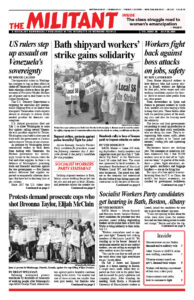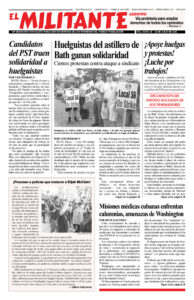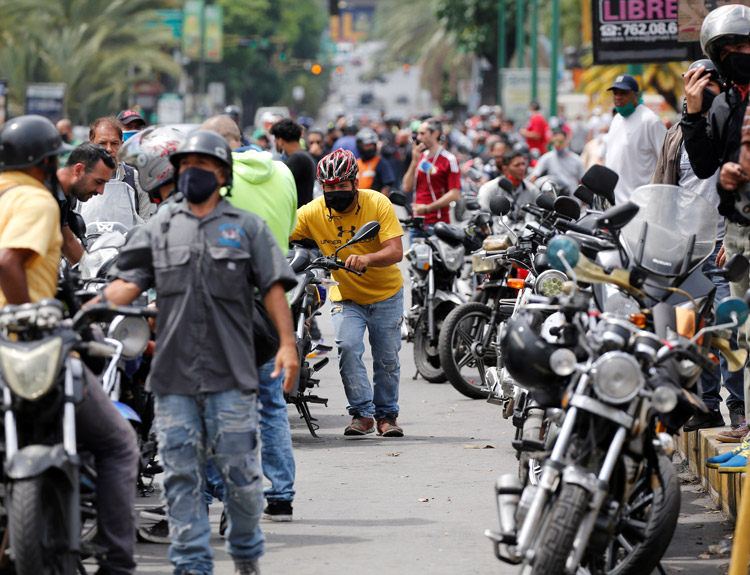The imperialist rulers in Washington continue to step up their efforts to choke off Venezuela’s oil trade, part of their relentless drive to force the government of President Nicolás Maduro out of power and to deal blows to the Cuban Revolution.
The U.S. Treasury Department is targeting for sanctions any international shipping firm or oil tanker that transports Venezuelan crude exports abroad or attempts to deliver direly needed gasoline for domestic consumption.
U.S. federal prosecutors filed suit July 1 to allow Washington to seize four tankers sailing toward Venezuela with gasoline supplied by Tehran. Washington aims both to deter any oil trade with the government in Caracas and to deprive Tehran of any revenue.
As pressure by Washington forces commercial traders to back down from dealing with Venezuela, the Maduro government has increasingly turned to the Iranian rulers for fuel and other supplies. In June — in defiance of Washington’s punishing trade and financial sanctions against the two governments — five Iranian tankers delivered fuel supplies expected to temporarily alleviate shortages that have led to dayslong lines at gas stations.
Since 2017 the U.S. rulers have ratcheted up crippling economic sanctions against Caracas, including an oil embargo. They’ve also imposed a broad ban on dealings by other governments with Venezuelan state enterprises. These moves have aggravated shortages of food, medicine, gasoline and equipment. Gasoline shortages got even worse after Russian oil producer Rosneft suspended operations in Venezuela in March.
Imperialist rulers in the United Kingdom, across Europe and in Canada — as well as some of Washington’s allies in Latin America — have joined Washington in declaring the Maduro government illegitimate. They claim the pro-imperialist opposition leader, Juan Guaidó, who proclaimed himself president in January 2019, is the real head of state.
The U.S. government seeks to capitalize on the economic and social crisis facing working people in Venezuela, the result of the sanctions, the COVID-19 outbreak, the worldwide capitalist crisis and collapse of the country’s oil industry.
A major target of Washington’s oil embargo against the Maduro government is blocking shipments to Cuba. Washington is tightening its over 60-year-long economic war against the Cuban people and their revolution.
The Cuban government has maintained its solidarity with the Venezuelan people and defense of their sovereignty. Most recently, a special contingent of doctors and nurses arrived in the state of Zulia to help beat back a COVID-19 outbreak in the city of Maracaibo. Cuban medical personnel are also deployed in towns along the border, treating Venezuelans returning from neighboring Colombia and Brazil, two countries where working people are being devastated by the disease.
The stepped-up pressure from Washington was buttressed when a British high court ruled July 2 to deny the Maduro government access to $1 billion worth of gold the country had placed in the Bank of England’s vaults.
The decision upholds the bank, which has refused to transfer 31 tons of Venezuelan gold — part of the patrimony of that country — to the Maduro government. Caracas filed suit after bank directors rejected a request to transfer the funds to a U.N. Development Program to purchase medical supplies and equipment to aid the fight against the coronavirus epidemic.
Oil industry in shambles
Alongside the punishing effects of U.S. sanctions, the state oil company PDVSA is saddled with crippling debt and corruption. Venezuela’s oil industry has been in shambles, with the lowest production levels in decades. In the last couple of years the Venezuelan government has increasingly opened the country’s nationalized oil fields to foreign exploitation, including Russian and Chinese corporations. The Maduro government has floated proposals to reduce taxes and royalties in an effort to attract foreign investment.
“Even the possibility of opening up completely to private capital” by the Maduro government, Dolores Dobarro, a Venezuelan oil law professor, told investment service Standard & Poors Global, “is more aggressive than the proposals from the political opposition.”
Presented by the Maduro government as a first step toward stabilizing gasoline supplies, a new distribution and pricing regime went into effect June 1 that puts an end to a long-standing policy to heavily subsidize fuel to the country’s population. The goal, said Maduro, is to bring prices more in line with those internationally. Venezuelans will now have to buy either a fixed quota of gas per month, at a price that is 75 percent subsidized, or have access to an unlimited amount at a price of 50 cents per liter, payable in U.S. dollars.
The “dollarized” stations run by private companies will also be permitted to import fuel, effectively ending a 50-year-long state monopoly on gasoline supply.
“There is no doubt the new scheme widens the gap between those who have access to dollars and those who don’t,” Luis Salas, a former vice president in Maduro’s government who opposes the measure, told Venezuelanalysis. This means greater difficulties for workers and farmers.
“Internationalizing” prices in a country where the minimum wage is around $5 per month and most public employees make around $10, “is not the way to go,” Salas argued. Cooking gas distribution, previously handled by PDVSA, is already in private hands in parts of the country, and the same thing is happening with electricity, he said.
“We still have to see what impact the price hike will have on prices of other goods and services,” he added.


